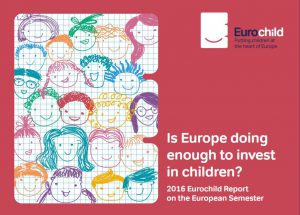 Based on a survey of 28 children’s rights organisations, Eurochild’s 2016 Report on the European Semester brings together the assessments of 28 contributors from 20 EU Member States. They looked at the extent to which the European Commission ‘Recommendation on Investing in Children: Breaking the cycle of disadvantage (2013) has been implemented in their country and whether the European Semester process is helping or hindering the achievement of positive outcomes for children.
Based on a survey of 28 children’s rights organisations, Eurochild’s 2016 Report on the European Semester brings together the assessments of 28 contributors from 20 EU Member States. They looked at the extent to which the European Commission ‘Recommendation on Investing in Children: Breaking the cycle of disadvantage (2013) has been implemented in their country and whether the European Semester process is helping or hindering the achievement of positive outcomes for children.
The report also offers alternative recommendations to turn this tragic cycle around and to encourage EU Member States to invest in children.
Eurochild’s assessment of the 2016 European Semester suggests that both the 2016 National Reform Programmes and the Country-Specific Recommendations give insufficient attention to breaking the poverty cycle.
In the Annual Growth Survey, released earlier this month by the European Commission to pave the way for the 2017 European Semester, Eurochild sees potential scope for greater attention to social priorities, albeit mainly through the lens of improving labour market participation. “We welcome the reminders to EU Member States that welfare systems need to be anchored in strong social standards, and that promoting work-life balance and addressing discrimination contribute not just to social fairness but also to growth”, added Ms. Hainsworth.
Eurochild members report some progress in the use of the European Commission Recommendation on Investing in Children (2013), compared to the previous annual cycle. The report also assesses civil society engagement in the Semester process, which received varied responses, with only four members indicating an active engagement over the last year.
Find the report here (EN).